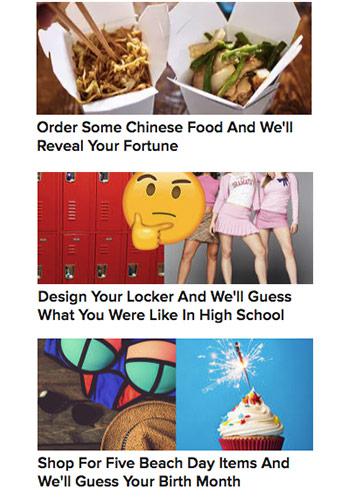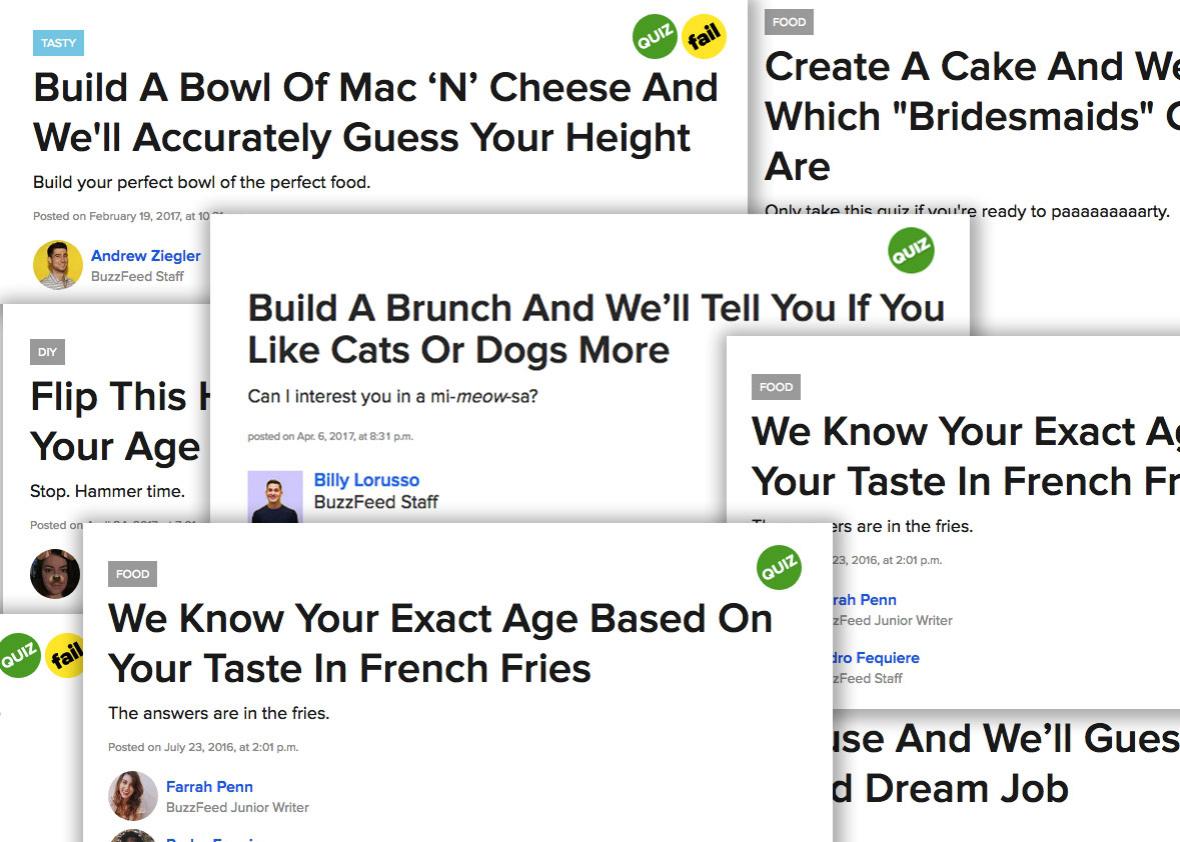Some things about myself I learned from BuzzFeed: I’m 40. I’m 5 foot 8. I’m 19 and I live in Glasgow, Scotland. I’m 24 and 5 foot 3. I’m 22 and my dream job is interior designer. I was born in Cornwall, England, in 1986. I’m mentally 80, but actually 23. My best quality is that I’m genuine. I’m cold-hearted but a little sweet. My crush already asked me to prom. I should major in history. My British soulmate is Henry Cavill. I only go to Starbucks to use the bathroom. I will find love in exactly 43 days. I’m going to have four kids. My unicorn name is Princess Indigo, First of Her Name.
As you may have guessed, none of these things are true. (Well, except my unicorn name.) I built this dossier of fake facts about myself by taking quizzes on BuzzFeed with titles like “Flip This House and We’ll Guess Your Age and Dream Job” and “Create a Cake and We’ll Tell You Which ‘Bridesmaids’ Character You Are.” Yes, these are real quizzes. Answer questions about one thing, preferably regarding some millennial-friendly topic—brunch! Outfits!—and the site will tell you a completely unrelated thing about yourself, such as whether you’re a cat or dog person! My introduction to these quizzes came via the classic “Build a Bowl of Mac ‘N’ Cheese and We’ll Accurately Guess Your Height,” which I stumbled upon shortly before I found “We Know Your Exact Age Based on Your Taste in French Fries.” Why, I began to ask myself, was BuzzFeed lately so intent on telling me things about myself I already knew?
When the BuzzFeed quiz first rolled out a few years ago, it was the online publisher’s answer to its original viral innovation, the list. Instead of “21 Things Only True Equestrians Will Understand,” now readers got “What City Should You Actually Live In?” Either way, it was all about them. The company went big on quizzes in 2014, NiemanLab reported at the time, and traffic followed. “The quiz is kind of like the broken-down-to-its-core of what BuzzFeed is—it gives someone something that they can relate to well enough that they can share it with others,” the editor behind the quiz initiative told NiemanLab.
But 2014 was long ago in internet time. BuzzFeed continues to publish identity-centric quizzes, like “Which ’00s Indie Band Are You?” But mixed in with those are these house-flipping, cake-creating quizzes that represent something else entirely, what seemed to me a strange new evolutionary wrinkle in this age of viral content. If before there were identity quizzes, these are entropy quizzes: a meaningless piece of information, run through a meaningless scoring formula, leads to more meaninglessness.
I took dozens. Some claim to predict something, the internet version of a schoolyard game of M.A.S.H.: “Build Your Ultimate Taco and We’ll Tell You if Your Relationship Is Doomed.” But many of them are more like a carnival huckster trying to guess your weight, promising not to tell you something new but to guess something with freakish accuracy: “Pretend to Order a Dozen Donuts From Krispy Kreme and We’ll Tell You Your Exact Birth Month.”
In a way, these quizzes seem like a response to the first generation of BuzzFeed’s quizzes, a way to satiate the masses no longer content with a mode of content that actually does something so predictable as make sense. Gone is the pretense that the answer will be right or revealing in some way. But we click and share anyway, because that’s how well BuzzFeed has accustomed us to consuming and sharing online content. Still, BuzzFeed is reportedly worth $1.7 billion; it’s hard to square that figure with knowing that part of what it does, maybe a small part but a part nonetheless, is creating quizzes that, try as they might, cannot manage to guess my height.
Matthew Perpetua is the site’s editor in charge of quizzes. When I called him, he did not give me nonsensical entropy responses but instead answered my questions thoughtfully. First off, he told me, these quizzes don’t represent some nefarious plan on BuzzFeed’s part to gather readers’ personal data or anything like that. As for why so many of the quizzes seem to promote brands (“Pretend to Do a Domino’s Order and We’ll Guess Your Age and Location”), well, that’s because brands are relatable. “We kind of call them ‘Build a This,’ you know, or ‘Create a …’” Perpetua said. “Building is kind of the main principle there.” The format has recently been gaining traction, thanks to writers and community contributors’ tendency to iterate when they happen upon a successful format.
Perpetua started at BuzzFeed as a music editor but switched to quizzes at the tail end of the initial traffic explosion: “The Facebook gods smiled upon it, until they decided not to anymore,” is how he described the craze and the crash that followed, characterized by lower traffic and reader backlash. The bar for sharing became higher; people realized their contacts would think it was lame if they clogged their news feeds with quiz results. But slowly and steadily, quizzes have grown since those dark days, and Perpetua reported that quiz traffic recently surpassed the 2013–2014 boom time.

BuzzFeed
Perpetua pointed to one particular entropy quiz as one of the past year’s most successful: “Pick an Outfit and We’ll Guess Your Exact Age and Height” has gotten about 9.9 million views since it was published in November. (The median for a quiz is just under 300,000.) Its arc may be instructive: The quiz performed well upon publication, racking up 4 million views before the end of the year, but then at some point in February, it blew up again, out of nowhere. “This was a big mystery for the people who work on the publishing end,” Perpetua said. “The theory is that it ended up in some kind of large closed Facebook group. From there, it just kind of jumped a fence into parts of the internet that don’t normally engage with BuzzFeed quizzes.” By this he meant old people, or people over 50. “The most popular, most widely shared result for that one was ‘You are 18 years old and 5 foot 7.’ ” These people over 50, Perpetua said, most of whom were women, most of whom were probably shorter than 5’7”, really enjoyed being told they were so young and so tall.
So for some of these quizzes, “There’s a pool of potential results that we know people like,” Perpetua said. The answers are wrong, but they’re wrong in a flattering way. Still, he said he advises quiz writers to ask themselves while writing whether the results feel random, whether quiz-takers will feel cheated. “There’s also ideally some kind of internal logic that makes the quizzes resonate.”
One of the most distinctive but least often noted features of BuzzFeed is that it keeps evolving. As New Yorker critic Emily Nussbaum recently wrote on Twitter, “ ‘Kitten listicle’ jokes about Buzzfeed are the new ‘narcissistic Kim Kardashian’ putdowns: a clueless cliche that renders your opinion MOOT.” Though the frequently brilliant ClickHole launched in 2014 as a BuzzFeed-esque parody, the reality is that BuzzFeed is now too sprawling a thing to parody. BuzzFeed runs a well-respected news division side by side with a kooky department that produces nonsensical quizzes, and the organization sees no reason it shouldn’t be thus. This is a realization of one of the promises of the social web: When people come to a page through Facebook or other social media, it matters not at all how a piece fits in with the rest of the content on the site. BuzzFeed is a publication that’s always trying out weird stuff, throwing spaghetti at the wall and seeing what sticks. Then, based on the pattern that spaghetti makes, it’ll tell you your blood type.
